Vipul Sharma, 20 July
Table of Contents
Introduction :
In today’s increasingly digital world, businesses are inundated with data. Each customer interaction, product sale, and market trend generates a wealth of information. However, without the right tools, this data can be more overwhelming than useful. That’s where Business Intelligence Tools come into play. They can turn raw data into actionable insights, helping organizations improve their performance, make informed decisions, and ultimately boost their bottom line. In this blog post, we’ll delve into how BI tools can significantly impact your company’s profitability.
Business Intelligence Tools Considering Below factors:
1. Understand Your Business In-Depth
With Business Intelligence Tools, businesses can transform raw data into meaningful insights. These tools can collect data from multiple sources, then analyze, organize, and visualize this information in a way that’s easy for anyone in your organization to understand. They help in identifying patterns, trends, and correlations that might go unnoticed in traditional spreadsheets. By doing so, BI tools provide a deeper understanding of your business operations, customer behavior, and market trends.
2. Improve Decision Making:
BI tools take the guesswork out of decision-making. By using data-driven insights, businesses can make decisions that are more informed and objective. Business Intelligence Tools provide real-time data, predictive analytics, and trend analysis which can enhance strategic planning and daily operational decisions. This improved decision-making can lead to increased operational efficiency, reduced costs, and better allocation of resources.
3. Enhance Customer Satisfaction:
Understanding your customers is crucial to business success. Business Intelligence Tools allow businesses to monitor customer behavior and identify trends. This enables them to deliver personalized experiences, enhance customer service, and develop products or services that meet customer needs. Satisfied customers are likely to be loyal customers, leading to increased sales and revenue.
4. Identify Cost Savings:
Business Intelligence Tools help identify areas where costs can be reduced without affecting performance. They can highlight inefficient processes, unnecessary expenditures, or areas of waste, enabling businesses to take corrective action. The result is improved operational efficiency and cost savings, which directly benefit the bottom line.
5. Boost Revenue:
By identifying new sales opportunities, predicting future trends, and optimizing pricing strategies, Business Intelligence Tools can significantly increase a company’s revenue. They enable businesses to forecast sales accurately, identify profitable customer segments, and optimize product offerings. This can lead to increased sales, market share, and profit margins.
6. Enhance Competitive Advantage:
In today’s fast-paced business environment, staying ahead of the competition is vital. Business Intelligence Tools can provide crucial market insights, enabling businesses to spot industry trends, monitor competitor activity, and understand changing customer preferences. These insights can help businesses stay competitive and innovate, further boosting their bottom line.
Conclusion :
Business Intelligence tools are no longer just a ‘nice-to-have’ but a ‘must-have’ in today’s data-driven business landscape. They offer in-depth insights into your business, enhance decision-making, improve customer satisfaction, identify cost savings, boost revenue, and provide a competitive edge. By harnessing the power of Business Intelligence Tools, businesses can turn their data into a strategic asset that significantly impacts their bottom line. In a world that is becoming increasingly complex and competitive, Business Intelligence Tools provide the clarity and insight businesses need to thrive.
Frequently Asked Questions:
What are Business Intelligence tools, and why are they essential for businesses?
Business Intelligence tools are software applications designed to collect, analyze, and present business data in a meaningful way. These tools help organizations make informed decisions by turning raw data into actionable insights. They offer functionalities like data visualization, reporting, and advanced analytics, enabling businesses to identify trends, spot opportunities, and address challenges more effectively.
What benefits can a business expect from using Business Intelligence tools?
Business Intelligence tools offer several benefits, including:
Data-driven Decisions: BI tools provide accurate and real-time data, enabling well-informed decision-making.
Improved Efficiency: Automated data analysis and reporting save time and resources.
Competitive Advantage: Insights gained from BI tools help businesses stay ahead of the competition.
Enhanced Collaboration: BI tools facilitate data sharing and collaboration among teams.
Predictive Analysis: Advanced analytics in BI tools can forecast future trends and outcomes.
Are Business Intelligence tools suitable for small businesses, or are they more geared toward larger enterprises?
Business Intelligence tools are valuable for both small businesses and larger enterprises. Many BI tools offer scalable options, allowing small businesses to start with basic features and then expand as they grow. These tools empower small businesses with insights to make strategic decisions and remain competitive in their market.

